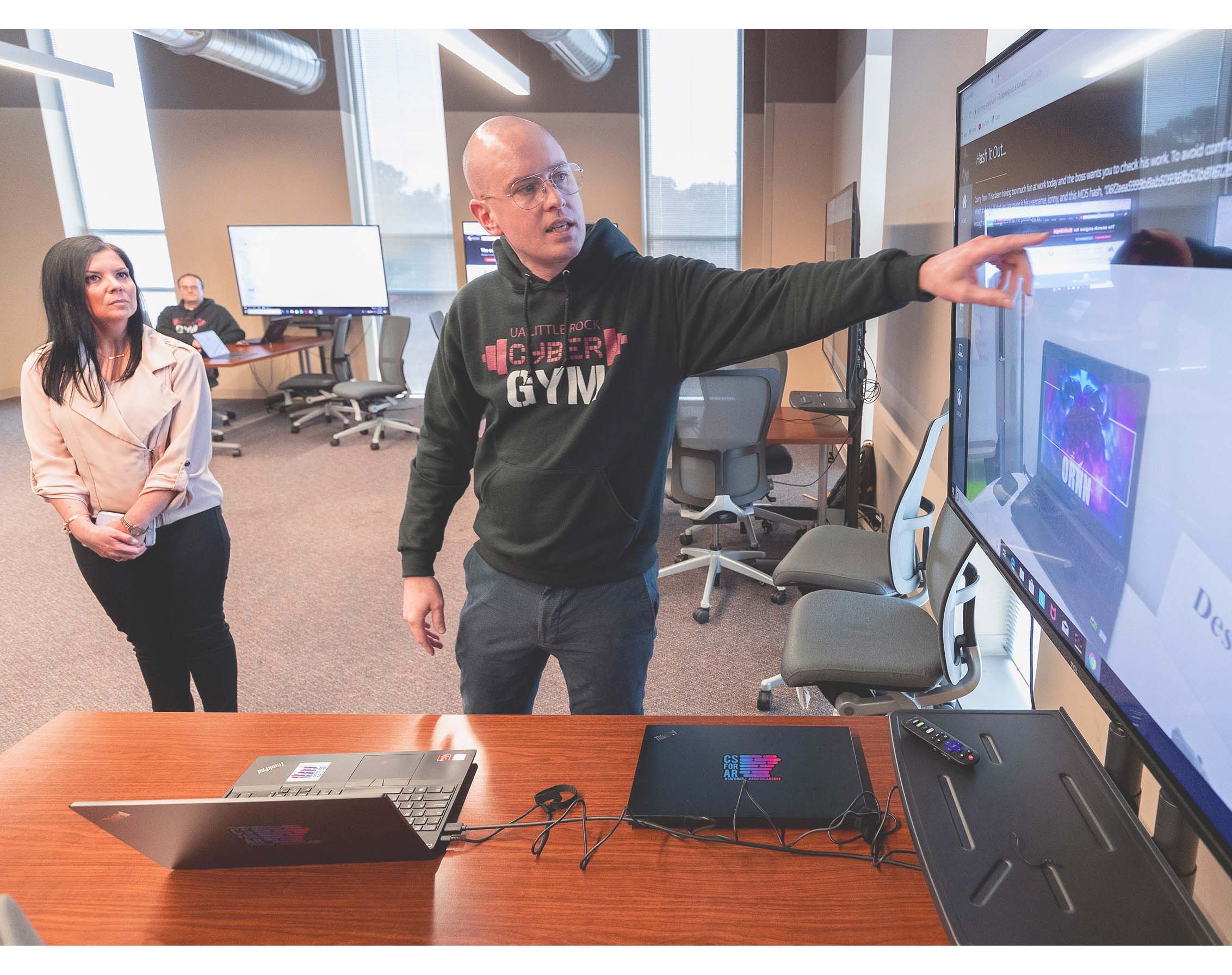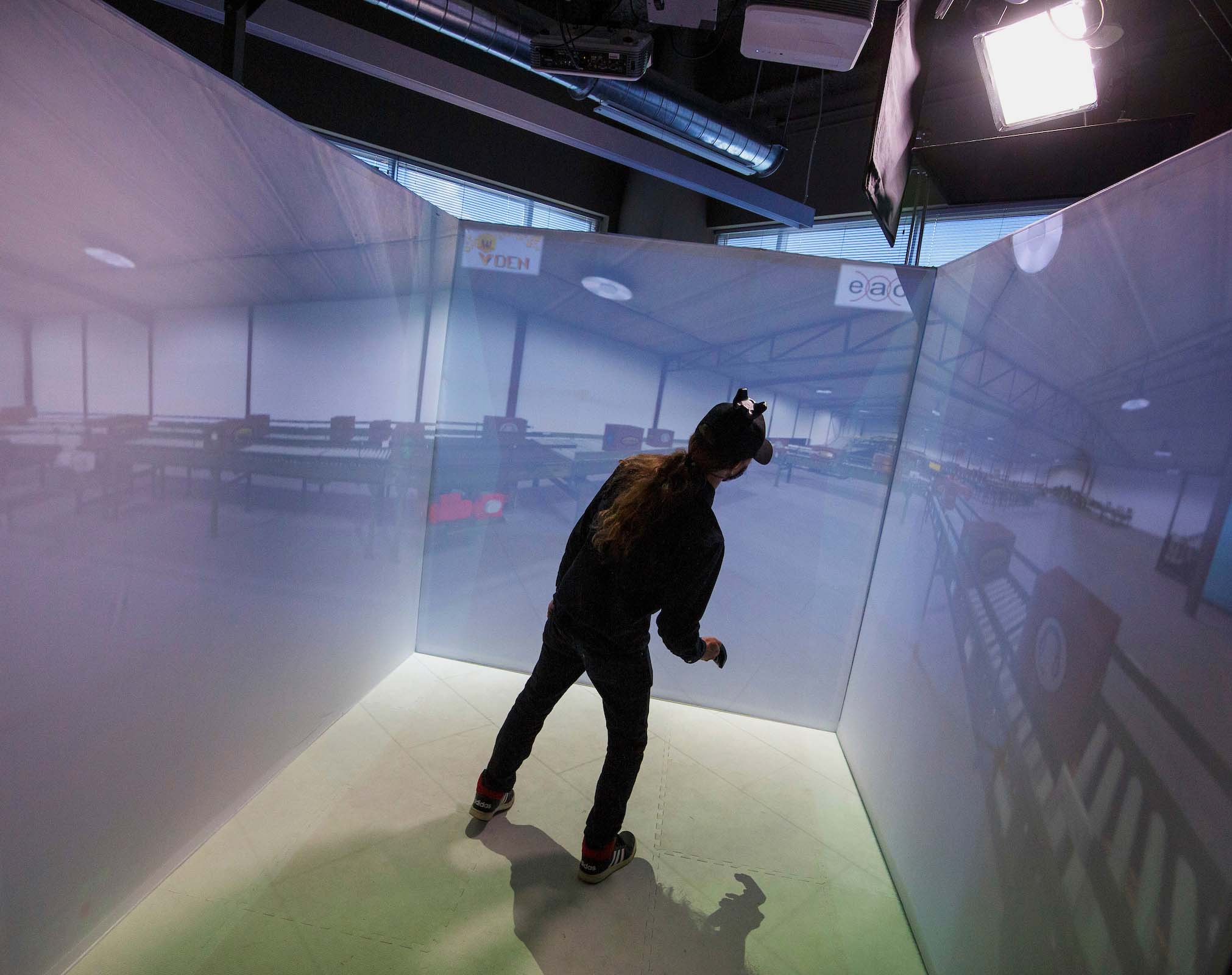Cyber College: UA Little Rock joins Pentagon network to strengthen U.S. cybersecurity.
March 21-27, 2022
By Angelita Faller
The University of Arkansas at Little Rock (UA Little Rock) has joined an inaugural network of academic partners across the country to work with the U.S. Cyber Command, one of the eleven unified combatant commands of the U.S. Department of Defense (DoD), to provide research, educational, and partnership opportunities in the field of cybersecurity.
UA Little Rock is one of 84 colleges and universities across the country chosen for the U.S. Cyber Command’s newly formed Academic Engagement Network (AEN), an alliance of public and private academic institutions collaborating to support and enhance four U.S. Cyber Command lines of effort: future workforce, applied cyber research, applied analytics and strategic issues.
“As more and more businesses realize the need to hire cybersecurity staff, they face an already short supply of talent,” said Sandra Leiterman, managing director of the UA Little Rock Cyber Arena, which provides cloud-based cybersecurity workouts. “Companies will struggle to implement appropriate controls and countermeasures if they do not have the expertise to advise them on how to meet today’s constantly changing cybersecurity threats. We want to be sure our students are ready for the changing landscape of cybersecurity and working with the U.S. Cyber Command’s AEN helps to ensure that we are teaching our students about the most recent technical and non-technical problems, threats, and solutions.”
AEN partners are intended to serve as an investment in creating a robust and accessible pool of qualified cyber professionals. Academic partners will help shape the cyber workforce while supporting the U.S. Cyber Command’s mission.
Dr. Philip Huff, an assistant professor of cybersecurity at UA Little Rock, said the partnership is a great fit for faculty and students interested in the latest tools and technology in cybersecurity.
“Being selected for this network shows UA Little Rock’s strength in cybersecurity research and education,” Huff said. “Our students will have additional opportunities to work with the U.S. Cyber Command, and we will have opportunities for guest speakers, student mentors, and to attend exclusive workshops. The shared knowledge and resources are beneficial to us both.”
Partners in the AEN consist of 70 universities, 14 community colleges, nine minority serving institutions, four military service academies, and four military war and staff colleges. Additional academic partners include Air Force Cyber College, John Hopkins University Information Security Institute, Purdue University Global and West Point.
“Cyber Command’s goal for the AEN is to strengthen our relationships and communication with these participating institutions,” said David Frederick, executive director of the U.S. Cyber Command. “This will improve and sustain our efforts to meet cyberspace educational requirements and workforce needs.”
The AEN extends partnerships to institutions through collaboration and access to the U.S. Cyber Command via scheduled events and engagements with command staff, the Cyber National Mission Force and four component commands.
Frederick added that the AEN will further enable the U.S. Cyber Command to shape and enhance cyber-focused innovation with partnerships and support the Department of Defense’s ongoing strategic dialogue on cyberspace.
The network leveraged various existing relationships with institutions of higher education as part of the U.S. Cyber Command’s overall Academic Engagement Strategy. UA Little Rock is a designated NSA Center for Academic Excellence in Cyber Defense. In 2021, UA Little Rock launched a new bachelor’s degree program in cybersecurity to help meet the rising demand for cybersecurity professionals in the country.
“The cybersecurity initiatives the Department of Computer Science and UA Little Rock are supporting have a unifying theme: workforce development in Arkansas and nationally,” said Dr. Albert Baker, chair of the Department of Computer Science at UA Little Rock. “U.S. Cyber Command is focused, in part, on strengthening our nation’s ability to withstand and respond to cyberattacks. That we have been selected as a partner in the U.S. Cyber Command Academic Engagement Network is a clear indication our academic programs, industry outreach, and research and development projects place UA Little Rock among the institutions leading the way in the evolution of the cybersecurity industry and in the development of the workforce required for this critically important industry.”
UA Little Rock has a long-standing partnership with the Forge Institute to provide workforce training, research, and educational opportunities. The most recent endeavor is a joint effort with the Forge Institute and the University of Arkansas at Pine Bluff that established the Consortium for Cyber Innovation to develop and align cyber education and grow applied research capabilities throughout the state.
“UA Little Rock’s approval to join the U.S. Department of Defense Cyber Command’s Academic Engagement Network represents a major step forward in establishing relationships to provide incredible learning experiences for students in Arkansas,” said Lee Watson, chairman and CEO of Forge Institute. “Inclusion in the network will also help further applied research efforts of the Consortium for Cyber Innovation (CCI). Forge Institute and CCI look forward to assisting UA Little Rock to leverage this relationship, which will help solidify Arkansas as a Cyber Defense State.”
UA Little Rock is also home to a number of cybersecurity workforce training and outreach programs, which includes the NSA Cybersecurity Workforce Certificate program, a partnership with the Arkansas Small Business and Technology Development Center to provide programming to help small businesses manage and mitigate the risks of cyber threats, and an NSA-sponsored summer camp for junior high and high school students.
As an officer in the university’s Cybersecurity Club, Daisa Mitchell said she is interested in opportunities that will help her excel in her future career in cybersecurity.
“I feel the Academic Exchange Network will be a great addition to UA Little Rock,” said Mitchell, a sophomore electronics and computer engineering technology major from Chidester. “I know I want to work in cybersecurity, but I’m not sure of all the pathways I can take just yet. I will eventually transition to the workforce, and this will give me a more solid idea of what I’d like to do in the cybersecurity field. This will help show students that their education is attainable.”
Photo Captions:
1. On the cover - Philip Huff, assistant professor of cybersecurity at UA Little Rock, and Sandra Leiterman, managing director of the UA Little Rock Cyber Arena, discuss cybersecurity education opportunities at UA Little Rock. (All photos by Ben Crain.)
2. UA Little Rock student Nick Stewart, center, discusses cybersecurity training workouts with Crystal Hartman of Forge Institute at the UA Little Rock Cyber Arena.
3. Sandra Leiterman, managing director of the UA Little Rock Cyber Arena, works with UA Little Rock students Andrew Bomberger, left, and Julia Green, right.
4. Dr. Albert Baker, center, chair of the UA Little Rock Department of Computer Science, views research projects by UA Little Rock students in the Emerging Analytics Center.







